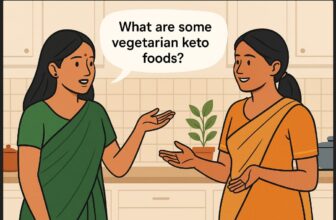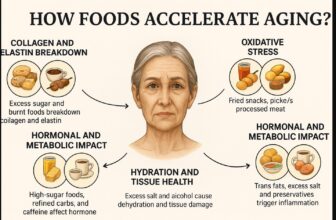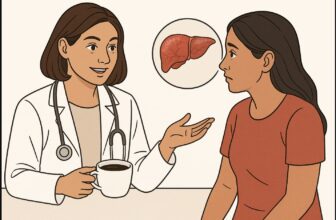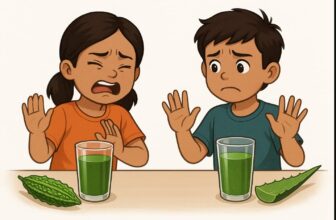In Indian households, health advice is often passed down through generations. While many traditional practices are helpful, others are based on outdated beliefs, cultural habits, or misinformation. These health myths can influence daily choices like what you eat, how you treat illness, or even how you take care of your body.
In this list, we break down 10 of the most common Indian health myths and explain why they don’t hold up when examined through science and medical evidence.
1. Cold Water Causes Sore Throat or Cold
What People Believe:
Drinking cold water or eating chilled foods leads to throat infections or cold symptoms.
What Science Says:
Sore throats and colds are caused by viruses or bacteria not the temperature of what you drink. Cold water may irritate an already sore throat, but it doesn’t cause infection on its own.
What You Can Do:
Stay hydrated with water at any temperature you’re comfortable with. If your throat feels sensitive, opt for lukewarm liquids.
2. Turmeric Can Cure All Illnesses
What People Believe:
Turmeric (haldi) is a natural cure for infections, wounds, inflammation, and even serious conditions.
What Science Says:
Turmeric contains curcumin, which has proven anti-inflammatory properties. However, it’s not a stand-alone treatment for diseases. It works best as a supportive element not a replacement for medical care.
What You Can Do:
Use turmeric as part of your diet, but rely on proper diagnosis and treatment for health issues.
3. Cracking Knuckles Leads to Arthritis
What People Believe:
Popping your knuckles damages joints and causes arthritis later in life.
What Science Says:
The cracking sound comes from gas bubbles in the joint fluid. Research has found no link between knuckle cracking and arthritis.
What You Can Do:
Crack your knuckles if it helps you stretch, but stop if you feel pain or stiffness it may indicate another issue.
4. Eating Curd at Night Is Unhealthy
What People Believe:
Having curd at night increases mucus and may cause cold or indigestion.
What Science Says:
For most people, curd is a good source of probiotics and protein, regardless of the time of day. There’s no evidence it becomes harmful after sunset.
What You Can Do:
If curd suits your digestion, it’s safe to consume even at night. Those with sinus problems may prefer to avoid it.
5. Washing Hair During Periods Is Unsafe
What People Believe:
Bathing or washing your hair during menstruation causes cramps, weakness, or even long-term harm.
What Science Says:
There is no physiological basis for this belief. In fact, hygiene is especially important during periods, and warm water can help relieve menstrual discomfort.
What You Can Do:
Maintain your hygiene routine during menstruation like any other day. It’s both safe and healthy.
6. Eating Sugar Causes Diabetes
What People Believe:
If you eat too many sweets, you’ll develop diabetes.
What Science Says:
Type 2 diabetes is caused by a combination of genetics, poor lifestyle habits, and insulin resistance. Sugar does not cause diabetes directly, though excessive intake can contribute to obesity and related risks.
What You Can Do:
Enjoy sweets occasionally but manage portion sizes. Focus on a balanced diet and regular physical activity.
7. Combining Milk and Fish Causes Skin Problems
What People Believe:
Having milk after eating fish causes skin diseases like white patches or allergies.
What Science Says:
There is no scientific evidence that combining fish and milk harms your skin or health. This myth likely arose from visual comparisons to conditions like vitiligo.
What You Can Do:
Both milk and fish are nutritious and can be eaten safely even together unless you have a personal food allergy.
8. Ghee Should Be Avoided for Weight Control
What People Believe:
Eating ghee makes you fat and should be eliminated from your diet.
What Science Says:
Ghee is rich in healthy fats and fat-soluble vitamins like A, D, and E. In moderation, it supports digestion, joint health, and brain function. Overconsumption, like with any fat, can cause weight gain.
What You Can Do:
Use 1–2 teaspoons of ghee daily in home-cooked food. It’s more beneficial than many refined oils.
9. Pregnant Women Must Eat for Two
What People Believe:
Pregnant women need to double their food intake to nourish the baby.
What Science Says:
Pregnancy increases nutrient needs not portion size. The required calorie increase is modest (around 300–400 extra calories in later stages).
What You Can Do:
Focus on iron, calcium, protein, and hydration. Quality matters more than quantity.
10. Home Remedies Are Always Safe
What People Believe:
Natural treatments have no side effects and are safer than medicines.
What Science Says:
Some natural remedies can interact with medicines or cause allergic reactions. Even herbs and oils can be harmful when misused or overused.
What You Can Do:
Use home remedies for minor issues but consult a doctor for ongoing or serious problems. Always disclose what you’re using during medical visits.
Summary: Debunking Popular Indian Health Myths
| Myth | What Science Says | Updated Advice |
|---|---|---|
| Cold water causes throat infections | Infections are viral, not temperature-based | Safe unless you’re already sick |
| Turmeric is a cure-all | Helpful but not a replacement for medicine | Use with proper treatment |
| Knuckle cracking causes arthritis | No evidence supports this | Stop only if it causes pain |
| Curd is bad at night | No harm for healthy individuals | Fine unless sinus issues exist |
| No bathing during periods | Myth with no scientific basis | Stay clean during menstruation |
| Sugar causes diabetes | Not directly lifestyle and genetics play a role | Limit intake, stay active |
| Milk with fish causes skin disease | Completely false | Both are safe together |
| Ghee makes you fat | Not if consumed mindfully | 1–2 tsp a day is healthy |
| Eat for two during pregnancy | Focus on nutrients, not bulk | Eat smart, not double |
| Home remedies are always safe | Not always—some can harm | Use with awareness and moderation |
While traditional wisdom plays an important role in Indian culture, it’s essential to update our beliefs with facts. Blindly following outdated health advice can lead to confusion or worse—mistakes in managing real health problems.
By understanding what’s myth and what’s medically accurate, you can take better care of yourself and guide your family with confidence and clarity.





